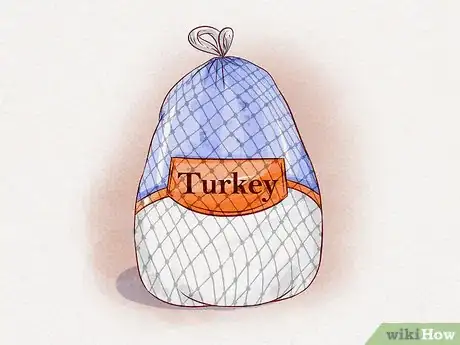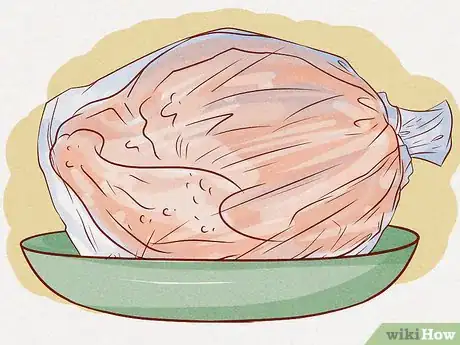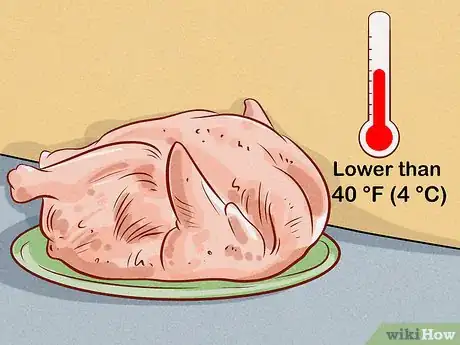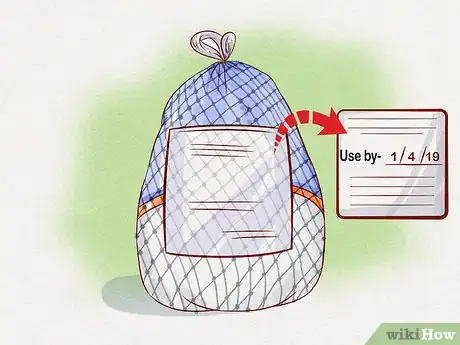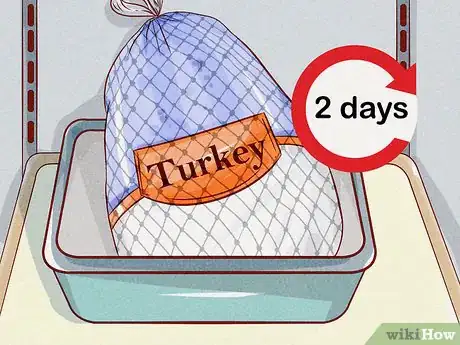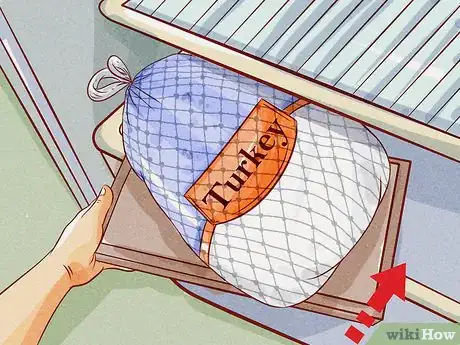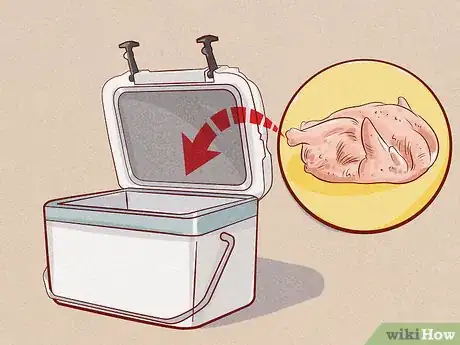This article was co-authored by Marrow Private Chefs. Marrow Private Chefs are based in Santa Rosa Beach, Florida. It is a chefs’ collaborative comprised of an ever-growing number of chefs and culinary professionals. Though regionally influenced primarily by coastal, traditional southern, cajun, and creole styles and flavors, the chefs at Marrow have a solid background in all types of cuisine with over 75 years of combined cooking experience.
There are 9 references cited in this article, which can be found at the bottom of the page.
This article has been viewed 211,732 times.
Whether you’re planning on preparing turkey for yourself or a holiday party, storing your turkey is an important part of keeping it clean and succulent. Any turkey can be kept in the freezer for long-term storage or moved to the refrigerator for thawing. Fresh or frozen whole turkeys, ground turkey, and turkey cutlets can all be stored this way so you get to savor every bite later.
Steps
Freezing a Turkey
-
1Keep the turkey in its packaging from the store. Manufacturers choose packaging that keeps bacteria out, maintaining the meat’s freshness. As soon as you remove the original packaging, you expose the meat to bacteria, increasing the potential for spoilage.[1]
- The packaging must be leak-proof. Check the turkey over before buying it. Avoid any turkeys with punctured or leaky packaging.
-
2Store uncooked turkeys in a freezer below 0 °F (−18 °C). At this temperature, the bird remains completely frozen. Freezing a turkey is the best way to retain its quality and freshness until you’re ready to use it. If you don’t plan on using the turkey right away, keep it on ice.[2]Advertisement
-
3Wrap fresh turkeys up before storing them in the freezer. Fresh turkeys are safe to store in the freezer, including hunted ones. If the turkey isn’t already packaged, wrap it tightly in aluminum foil or plastic wrap. Put it in an airtight bag and store it for up to a year.[3]
- Vacuum sealed bags are the best way to keep turkeys fresh. If this isn’t an option, put the wrapped turkey into a large bag, such as a garbage bag, and push the air out before tying it up tightly.
Warning: Don’t rinse the turkey before wrapping it. Doing so could spread harmful germs around your sink and other kitchen work surfaces.[4]
-
4Store the turkey for up to 1 year for maximum freshness. Whole turkeys last an entire year, but turkey parts tend to not last as long. Parts like wings and drumsticks stay fresh for about 9 months in their proper packaging. Ground turkey is best when used within 3 to 4 months.
- Technically, turkey can be stored indefinitely in the freezer. After about a year, turkey begins losing quality. Some turkeys last longer, while others take on freezer burn or odors from the freezer.
-
5Preserve frozen pre-stuffed turkeys in the freezer before cooking. These turkeys do not require thawing. When you’re ready to use them, heat them up in the oven according to the instructions on the packaging.[5]
- Make sure whole pre-stuffed turkeys have been inspected and certified by your national government as safe for consumption. Proof of certification will be on the packaging.
Refrigerating a Turkey
-
1Store turkey in a refrigerator set lower than 40 °F (4 °C). When the temperature climbs higher than that, bacteria start spreading on the turkey. You have about 2 hours to start cooking the turkey once it surpasses 40 °F (4 °C). To avoid any risk, throw away any turkeys kept unrefrigerated for longer periods of time.[6]
- Bacteria will start growing on the turkey as soon as it reaches 40 °F (4 °C). Even if the turkey is in its original packaging and you put it back in the refrigerator, the bacteria will still be present.
-
2Check fresh turkeys for a use by date. The “use by” or “sell by” date indicates how long a fresh, store-bought turkey lasts when refrigerated. Look for the date on the turkey’s plastic packaging. Turkeys last approximately 2 days after the printed date.[7]
- The date shows how long you can safely refrigerate the turkey. These turkeys are often preserved and kept extra cold by the manufacturer and grocery store, so they last longer.
- The use or sell by dates are valid as long as you keep the turkey sealed in its original packaging. Freeze the turkey if you don’t plan on cooking it before it expires.
-
3Keep undated turkeys refrigerated for up to 2 days after they thaw. A turkey is safe in the refrigerator until it fully thaws. After that, it stays fresh for a few extra days as long as it is still in its original packaging. Use the turkey before it turns slimy or begins smelling like rotten eggs, signs that it has spoiled.[8]
- The same rules apply to turkey portions and ground turkey. They spoil about 2 days after thawing.
-
4Place the turkey on a tray on the bottom shelf of the refrigerator. The coldest part of the refrigerator is typically the back end of the lowest shelf. Set the turkey on a baking tray to catch any juices escaping from the packaging. The pan keeps the refrigerator clean, preventing the spread of germs.
- Another good place to store a turkey is the meat drawer if your refrigerator has one.
Preserving a Defrosted Turkey
-
1Defrost the turkey in the refrigerator if possible. Using the refrigerator is the safest way to defrost a turkey. All you have to do is put the frozen turkey in the refrigerator. Expect the turkey to need 24 hours per 5 lb (2.3 kg) of meat to defrost completely. After it defrosts, it then stays fresh for 2 more days in the refrigerator.[9]
- The most common alternative to refrigerator defrosting is a cold water bath. Put the turkey in a sink filled with cold water below 40 °F (4 °C). Replace the water every 30 minutes to keep the turkey safe.
- If your turkey is small enough, remove the wrapping and put it in the microwave. Use the defrost setting to heat it up quickly.
-
2Put a refrigerator-thawed turkey back in the freezer if you don't cook it. Leave the turkey in its original packaging to avoid exposing it to bacteria. Store the turkey in the freezer within 2 days of it thawing. It will last up to 1 year in the freezer.[10]
- Turkeys thawed in water or the microwave cannot be refrozen. They will already have bacteria growing on them.
-
3Store turkeys in ice-filled coolers while transporting them. If you’re traveling or don’t have a refrigerator or freezer handy, you still need to keep your turkey below 40 °F (4 °C). Line a cooler with ice packs or fresh ice. Fit the turkey into the cooler and shut the lid. Then, check the cooler every so often to make sure the turkey is still cold.[11]
- The best way to gauge the cooler’s temperature is with a reprogrammable kitchen thermometer. Set the thermometer to beep when the cooler’s temperature gets close to 40 °F (4 °C).
Community Q&A
-
QuestionIs it safe to freeze a fresh turkey?
 Community AnswerYes. You may freeze it.
Community AnswerYes. You may freeze it. -
QuestionHow long can a commercial fresh turkey be kept in the refrigerator before roasting?
 Community AnswerThe turkey should be roasted within two or three days.
Community AnswerThe turkey should be roasted within two or three days. -
QuestionHow long can I keep a frozen turkey in a snow bank?
 Community AnswerAs long as the meat remains frozen solid, it can sit in the snow bank until spring.
Community AnswerAs long as the meat remains frozen solid, it can sit in the snow bank until spring.
Warnings
- Turkeys left to thaw at room temperature are not safe to eat. The same rule applies for cooked turkeys left at room temperature for more than 2 hours.⧼thumbs_response⧽
- Fresh or thawed turkeys for the most part cannot be refrozen. Most turkeys will spoil or end up unsafe to eat. Only frozen turkeys defrosted in the refrigerator are safe for refreezing.⧼thumbs_response⧽
- Don’t wash or rinse a raw turkey. Rinsing isn’t an effective way to remove bacteria from the turkey, and it can actually increase your risk of getting sick by splashing harmful germs around your kitchen. The best way to get rid of bacteria is to cook the turkey to an internal temperature of 165 °F (74 °C).[12]⧼thumbs_response⧽
Things You'll Need
Freezing a Turkey
- Freezer
- Packaged, pre-frozen turkey
- Aluminum or plastic wrap for fresh-caught turkeys
- Airtight plastic bags or trash bags for fresh-caught turkeys
Refrigerating a Turkey
- Refrigerator
- Turkey
- Tray
Preserving a Defrosted Turkey
- Refrigerator
- Cooler
- Ice or ice packs
- Kitchen thermometer
Expert Interview

Thanks for reading our article! If you'd like to learn more about storing a turkey, check out our in-depth interview with Marrow Private Chefs.
References
- ↑ https://www.foodwine.com/food/egg/egg1197/chapter2.html
- ↑ https://www.eatright.org/homefoodsafety/safety-tips/holidays/frozen-turkey-safety-tips
- ↑ https://www.foodwine.com/food/egg/egg1197/chapter2.html
- ↑ https://www.usda.gov/media/blog/2013/11/21/wash-or-not-wash-your-turkey
- ↑ https://www.fsis.usda.gov/wps/portal/fsis/topics/food-safety-education/get-answers/food-safety-fact-sheets/poultry-preparation/stuffing-and-food-safety
- ↑ https://www.charlotteobserver.com/living/food-drink/article45625827.html
- ↑ https://www.eatbydate.com/proteins/poultry/turkey-shelf-life-expiration-date/
- ↑ https://www.stilltasty.com/questions/index/112
- ↑ https://www.safefood.eu/Healthy-Eating/Food,-Diet-and-Health/Seasonal-Features/Christmas-tips-and-advice/Buying,-storing-and-defrosting-your-turkey.aspx
About This Article
To store an uncooked turkey for more than a few days, leave it in its original packaging and keep the turkey in your freezer for up to 1 year. If you need to thaw out a frozen turkey or if you plan to use your uncooked turkey soon after buying it, place it on a tray and store it on the bottom shelf of your refrigerator. Be sure to use the uncooked turkey within 2 days! You can preserve the turkey in the freezer if you haven't used it within 48 hours. For more tips on defrosting uncooked turkey safely, read on!
